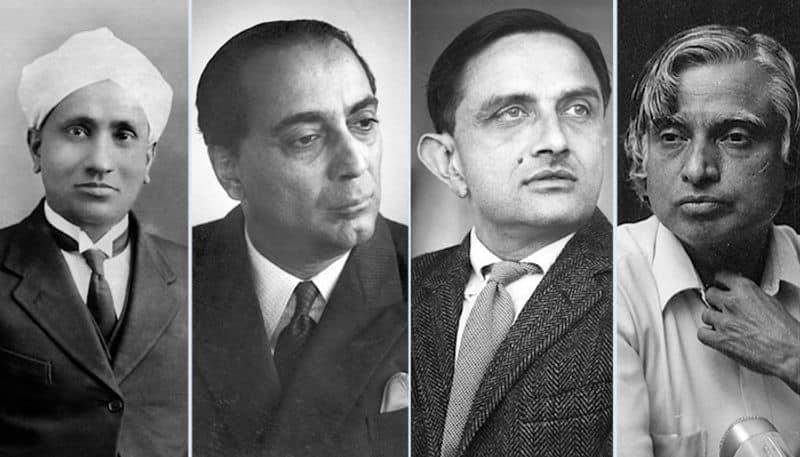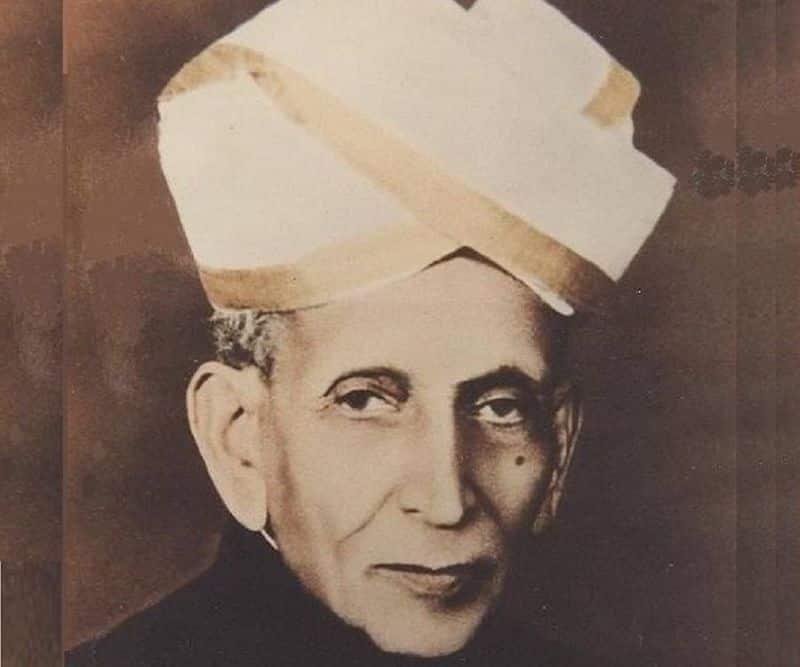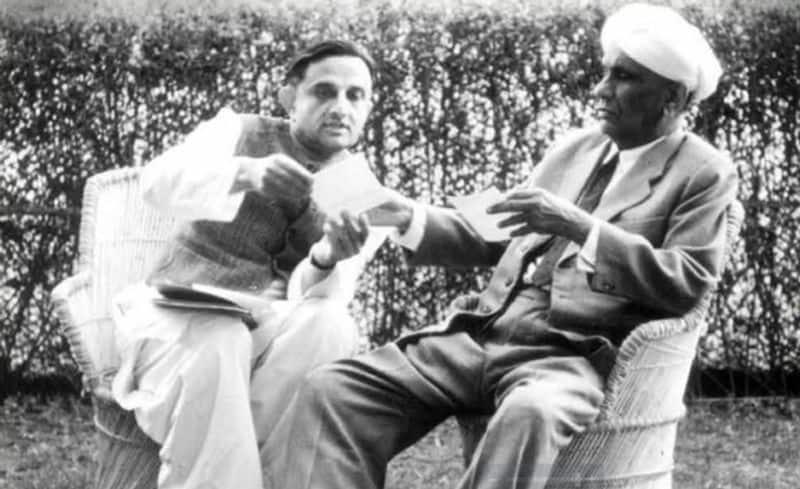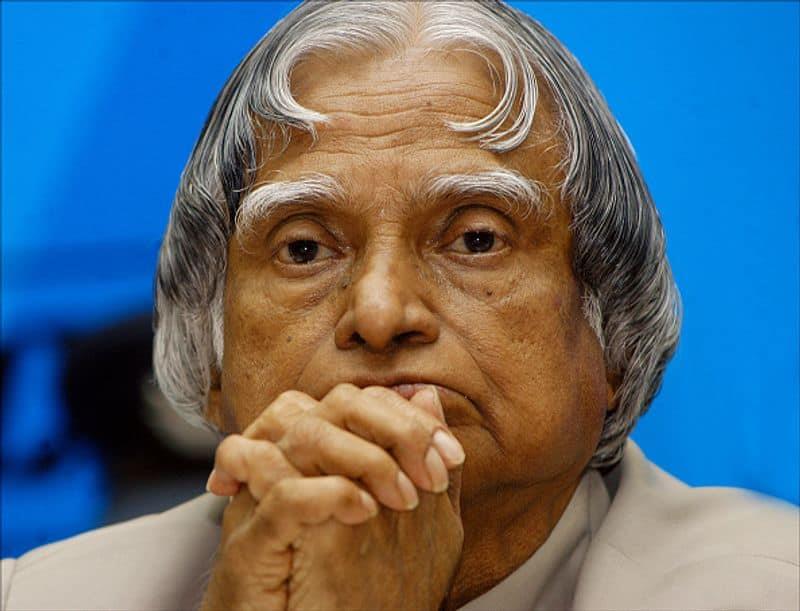
World Science Day 2023: CV Raman To APJ Abdul Kalam - 20 Indian Scientists Who Reshaped Global Innovation
1. Dr. CV Raman:
Dr. Chandrasekhara Venkata Raman, born on November 7, 1888, in Tiruchirapalli, India, was a pioneering physicist awarded the Nobel Prize in Physics in 1930 for his groundbreaking work on light scattering, known as the Raman effect. His experiments unveiled the shift in wavelength when light passes through a transparent material, providing valuable insights into light behavior. Dr. Raman's contributions extended to acoustics, notably in studying the harmonic nature of Indian musical instruments. Despite health challenges, he continued his scientific pursuits until his passing on November 21, 1970, leaving an enduring legacy as the first Asian Nobel laureate in the sciences and one of India's most celebrated scientists.
2. Homi J Bhabha:
Homi Jehangir Bhabha, born on October 30, 1909, in Bombay, India, was a visionary scientist and the chief architect of India's nuclear program. Renowned for his contributions to quantum theory, Bhabha played a pivotal role in convincing India's leadership, including Jawaharlal Nehru, to embark on an ambitious nuclear program. While serving as the first Chairman of the Atomic Energy Commission of India, he advocated for the peaceful use of nuclear energy and strongly opposed the development of atomic bombs. Tragically, his life was cut short when Air India Flight 101, in which he was traveling, crashed near Mont Blanc on January 24, 1966 that led to various conspiracy theories, including alleged involvement of the Central Intelligence Agency (CIA). Homi J Bhabha's legacy endures as the father of India's nuclear power program, emphasizing the importance of scientific pursuits for peaceful and constructive purposes.
3. Sir Visvesvaraya:
Sir Mokshagundam Visvesvaraya, born on September 15, 1860, in Muddenahalli, India, was a distinguished engineer, scholar, and statesman. Serving as the Diwan of Mysore from 1912 to 1918, Visvesvaraya made significant contributions to India's industrial and economic development. His innovative engineering solutions included the invention of automatic sluice gates and a block irrigation system, which continue to be marvels in the field. Beyond his engineering prowess, he envisioned India as an industrialized nation and actively promoted the idea that industrialization could elevate the country's status. Sir M V, as he is affectionately known, was awarded the Bharat Ratna, India's highest civilian honor, and his birthday, September 15, is celebrated as Engineer's Day in India, honoring his legacy and contributions to the field of engineering.
4. Venkatraman Radhakrishnan:
Venkatraman Radhakrishnan, born on May 18, 1929, in Tondaripet, Chennai, was a globally acclaimed space scientist and astrophysicist from India. Serving as the chairman of the Indian Space Research Organisation (ISRO) from 2009 to 2014, Radhakrishnan made significant contributions to India's space exploration endeavors. His expertise extended beyond the theoretical realm, as he was also known for his hands-on work, including the design and fabrication of ultralight aircraft and sailboats. Radhakrishnan's observations and theoretical insights played a crucial role in unraveling mysteries surrounding pulsars, interstellar clouds, and various celestial bodies. His remarkable career and dedication to advancing space science made him a respected figure in the global scientific community. Radhakrishnan passed away at the age of 81 in Bangalore, leaving behind a legacy of excellence in space research.
5. S. Chandrashekar:
Subrahmanyan Chandrasekhar, born on October 19, 1910, in Lahore, British India, was a brilliant astrophysicist whose profound contributions earned him the Nobel Prize for Physics in 1983. Renowned for his mathematical theory of black holes and the Chandrasekhar limit, his work significantly advanced our understanding of stellar evolution. His most celebrated research delved into the radiation of energy from stars, particularly white dwarf stars. Chandrasekhar's intellectual prowess led him to become a United States citizen in 1953. Throughout his illustrious career, he made groundbreaking contributions to astrophysics, leaving an enduring impact on the field. Subrahmanyan Chandrasekhar passed away on August 21, 1995, in Chicago, leaving behind a legacy of transformative insights into the workings of the cosmos.
6. Satyendra Nath Bose:
Satyendra Nath Bose, born on January 1, 1894, in Calcutta, India, was an eminent physicist known for his groundbreaking contributions to quantum mechanics. Bose's most significant work involved his collaboration with Albert Einstein, resulting in the development of Bose-Einstein statistics, a crucial aspect of quantum physics. In 1924, Bose wrote a paper titled "Planck's Law and the Hypothesis of Light Quanta," which Einstein translated into German and published, marking the foundation of the Bose-Einstein statistics. His pioneering work laid the groundwork for understanding the behavior of particles known as bosons, a category named in his honor by Paul Dirac. Beyond his scientific achievements, Bose received the Padma Vibhushan, India's second-highest civilian award, in 1954, recognizing his outstanding contributions to the field of physics. Satyendra Nath Bose's legacy continues to influence quantum physics and remains a testament to India's rich scientific heritage.
7. Meghnad Saha:
Meghnad Saha, born on October 6, 1893, in Dhaka, British India (now in Bangladesh), was a distinguished astrophysicist and mathematician. His most renowned work involved the formulation of the Saha Equation, a fundamental tool in astrophysics for interpreting the spectra of stars. This equation provided a means to determine the ionization state of various elements within a star by analyzing its spectrum. Saha's contributions extended beyond astrophysics; he also invented an instrument to measure the weight and pressure of solar rays. Additionally, he played a crucial role in river planning in India, crafting the original plan for the Damodar Valley Project. Elected as a Fellow of the Royal Society of London in 1927, Meghnad Saha's interdisciplinary contributions left an enduring impact on both astrophysics and applied science in India. He passed away on February 16, 1956, leaving behind a legacy of scientific excellence.
8. Srinivasa Ramanujan:
Srinivasa Ramanujan, born on December 22, 1887, in Erode, Tamil Nadu, India, was a mathematical prodigy whose unparalleled contributions left an indelible mark on the field. Despite facing numerous challenges and minimal formal training, Ramanujan independently discovered a plethora of complex theorems and mathematical identities, showcasing an innate genius. His work, particularly in areas like number theory and infinite series, continues to influence modern mathematics. Ramanujan's ability to intuitively grasp mathematical concepts led to his collaboration with renowned mathematicians like G.H. Hardy, and his legacy endures as an inspiration for aspiring mathematicians worldwide. Unfortunately, his life was cut short at the age of 32, but the depth of his contributions ensures that Srinivasa Ramanujan remains an iconic figure in the realm of pure mathematics.
9. Jagadish Chandra Bose:
Jagadish Chandra Bose, born on November 30, 1858, in Bikrampur, Bengal Presidency (present-day Bangladesh), was a polymath whose versatile contributions spanned physics, biology, botany, and archaeology. A pioneer in the study of radio and microwave optics, Bose made history by demonstrating wireless communication for the first time using semiconductor junctions. His inventions laid the foundation for future technological advancements. Beyond his scientific achievements, Bose's botanical research, particularly with the crescograph, enhanced our understanding of plant physiology. Notably, he believed in open technology, freely sharing his inventions for further development. Additionally, Bose is considered the father of Bengali science fiction, showcasing his multifaceted talents. His reluctance to patent his work and his commitment to scientific inquiry have cemented Jagadish Chandra Bose as a trailblazer in both Indian science and literature.
10. Vikram Sarabhai:
Vikram Sarabhai, born on August 12, 1919, in Ahmedabad, Gujarat, India, is revered as the Father of India's space program. A visionary scientist, Sarabhai played a pivotal role in establishing the Indian Space Research Organisation (ISRO) in 1969. Emphasizing the societal applications of advanced technologies, he aimed to harness space science for India's development. Beyond his remarkable contribution to space research, Sarabhai was instrumental in founding prestigious institutions like the Indian Institute of Management, Ahmedabad (IIM-A), and the Nehru Foundation for Development. His leadership and foresight not only propelled India into the space age with the successful launch of Aryabhata, the country's first satellite, in 1975 but also left an enduring legacy as a pioneer in shaping the trajectory of Indian science and technology. Vikram Sarabhai's influence extends far beyond his time; he was awarded the Padma Bhushan in 1966, and his legacy continues to inspire generations of scientists and space enthusiasts in India.
11. Salim Ali:
Salim Moizuddin Abdul Ali, born on November 12, 1896, in Mumbai, India, earned recognition as one of the preeminent ornithologists and naturalists in the world. Known as the "Birdman of India," Salim Ali made pioneering contributions to the field of ornithology by conducting systematic bird surveys across India. His extensive research and numerous bird books significantly advanced the understanding of avian species in the Indian subcontinent. Ali's dedication went beyond scholarly pursuits; he played a pivotal role in shaping the Bombay Natural History Society after 1947, using his influence to garner government support for the organization. Awarded India's second-highest civilian honor, the Padma Vibhushan, in 1976, Salim Ali's passion for birds and conservation left an enduring impact on Indian ornithology, inspiring generations of naturalists and environmentalists.
12. Har Gobind Khorana:
Har Gobind Khorana, born on January 9, 1922, in Raipur, British India (now in Pakistan), was an Indian-American biochemist whose groundbreaking work in deciphering the genetic code earned him the Nobel Prize in Physiology or Medicine in 1968. Collaborating with Marshall W. Nirenberg and Robert W. Holley, Khorana's research focused on understanding how the order of nucleotides in nucleic acids controls the synthesis of proteins within a cell. In 1970, he achieved another milestone by synthesizing an artificial gene in a living cell, laying the foundation for subsequent advancements in biotechnology and gene therapy. Khorana's groundbreaking contributions to molecular biology revolutionized the understanding of the genetic code, and his work continues to be instrumental in ongoing research in the field. Har Gobind Khorana passed away on November 9, 2011, leaving behind a profound legacy in the realm of biological sciences.
13. Birbal Sahni:
Birbal Sahni, born on November 14, 1891, in West Punjab, British India (now in Pakistan), was a distinguished Indian paleobotanist, geologist, and archaeologist. His profound contributions to the study of plant fossils and paleobotany have left an enduring impact on the understanding of the flora of the Indian subcontinent, both in contemporary and historical contexts. Elected as a Fellow of the Royal Society of London in 1936, Sahni received the highest British scientific honor, a testament to his significant contributions. Notably, he was the founder of The Paleobotanical Society and played a key role in establishing the Institute of Palaeobotany. His commitment to advancing scientific knowledge in India was evident not only in his paleobotanical research but also in his contributions to archaeology. Birbal Sahni passed away on April 10, 1949, but his legacy lives on through his pioneering work and the institutions he helped establish.
14. Dr CNR Rao:
Dr CNR Rao, born on June 30, 1934, in Bangalore, India, is a preeminent Indian chemist celebrated for his remarkable contributions to the field of solid-state and structural chemistry. An iconic figure in Indian science, Rao has authored over 1,600 research papers and numerous books, leaving an indelible mark on the global scientific community. His pioneering work includes elucidating the structure of novel materials and advancing our understanding of chemical bonding in solids. Recognized for his outstanding achievements, he was awarded the Bharat Ratna, India's highest civilian honor, in 2014. Additionally, he has been honored with several international awards, including the prestigious Priestley Medal. CNR Rao's enduring passion for chemistry, coupled with his dedication to scientific research and education, has solidified his position as one of India's most eminent and respected scientists.
15. Dr Venkatraman Radhakrishnan (Chemistry):
Dr. Venkatraman Ramakrishnan, born on April 6, 1952, in Chidambaram, India, is a distinguished structural biologist and Nobel laureate renowned for his contributions to chemistry. In 2009, he was awarded the Nobel Prize in Chemistry, alongside Thomas A. Steitz and Ada E. Yonath, for their groundbreaking work on the structure and function of the ribosome. Dr. Ramakrishnan's research has provided key insights into the molecular mechanisms of protein synthesis, unraveling the complex machinery within cells. His work not only deepens our understanding of fundamental biological processes but also holds significant implications for drug development and the treatment of various diseases. Currently serving as the President of the Royal Society, Dr. Venkatraman Ramakrishnan continues to be a leading figure in the field of structural biology, pushing the boundaries of scientific knowledge and inspiring future generations of researchers.
16. Dr SS Bhatnagar:
Dr. Shanti Swaroop Bhatnagar, born on February 21, 1894, in Bhera, British India (now in Pakistan), was an eminent Indian scientist and the first Director-General of the Council of Scientific and Industrial Research (CSIR). Regarded as the "Father of Research Laboratories" in India, Dr. Bhatnagar made significant contributions to the fields of chemistry and metallurgy. His pioneering research encompassed the development of techniques for extracting valuable minerals and the production of high-quality steel. In recognition of his outstanding contributions to science, he was posthumously awarded the Bharat Ratna, India's highest civilian honor, in 1954. Dr. S. S. Bhatnagar's legacy extends beyond his own scientific achievements to the establishment and promotion of research institutions, fostering a culture of scientific inquiry and innovation in India.
17. Dr GN Ramachandran:
Dr. G. N. Ramachandran, born on October 8, 1922, in Ernakulam, India, was a distinguished biophysicist and crystallographer who made significant contributions to our understanding of the structure and function of biological macromolecules. His most notable work includes the development of the Ramachandran plot, a widely used tool in structural biology for analyzing protein backbone conformations. This groundbreaking contribution facilitated the interpretation of X-ray crystallography data, advancing the comprehension of protein structures. Dr. Ramachandran's research extended to areas such as collagen structure, molecular dynamics, and enzyme catalysis. His scientific acumen was widely recognized, and he received several honors, including the Shanti Swarup Bhatnagar Prize and the Padma Vibhushan, one of India's highest civilian awards. Dr. G. N. Ramachandran's enduring impact on the field of biophysics has left a lasting legacy, influencing generations of researchers worldwide.
18.
Dr Vijay Bhatkar
Dr. Vijay Bhatkar, born on October 11, 1946, in Akola, Maharashtra, India, is a renowned computer scientist and technologist celebrated for his significant contributions to the field of supercomputing in India. He played a pivotal role in leading the development of India's first supercomputer, PARAM, in the 1980s, marking a crucial milestone in the country's technological landscape. Dr. Bhatkar's visionary leadership and innovation have had a lasting impact on high-performance computing in India, contributing to advancements in scientific research and technological applications. His remarkable journey includes serving as the Director of the Center for Development of Advanced Computing (C-DAC) and contributing to initiatives that promote technology for societal development. Dr. Vijay Bhatkar's multifaceted career and commitment to technological progress have earned him recognition, including the Padma Bhushan, one of India's prestigious civilian honors.
19. Shankar Balasubramanian:
Shankar Balasubramanian, born in 1966, is a distinguished chemist and professor known for his groundbreaking contributions to the field of genomics. A professor at the University of Cambridge, he is renowned for co-inventing the DNA sequencing technique, which has played a pivotal role in advancing genomic research and personalized medicine. Alongside his collaborator, David Klenerman, Balasubramanian developed the Solexa sequencing technology, a key component of modern DNA sequencing methods. His innovative work has significantly enhanced our ability to decipher the genetic code with unprecedented speed and accuracy. In recognition of his contributions, Shankar Balasubramanian has received numerous accolades, including a knighthood in the Queen's Birthday Honours in 2017. His work continues to shape the landscape of genomics, opening new avenues for understanding and leveraging the information encoded in our DNA.
20. APJ Abdul Kalam:
Last, but not the least -
Avul Pakir Jainulabdeen Abdul Kalam, widely known as A.P.J. Abdul Kalam, was born on October 15, 1931, in Rameswaram, Tamil Nadu, India. Fondly remembered as the "People's President," Kalam was an eminent aerospace engineer, scientist, and visionary leader. He played a pivotal role in India's space and defense programs, leading the successful development of ballistic missile technology. A.P.J. Abdul Kalam served as the 11th President of India from 2002 to 2007 and became a symbol of inspiration for millions, especially the youth, due to his humility, wisdom, and dedication to education and national development. Beyond his presidential tenure, Kalam continued to engage with students and the public, promoting science, education, and the pursuit of knowledge. His indomitable spirit and commitment to a developed and self-reliant India earned him widespread respect. A.P.J. Abdul Kalam passed away on July 27, 2015, leaving behind a legacy of scientific brilliance, leadership, and a vision for a prosperous and united nation.
The accomplishments of these Indian scientists transcend borders, showcasing the nation's prowess in diverse scientific disciplines. Their work has not only enriched global knowledge but also inspired future generations of scientists in India and beyond. As the world continues to face complex challenges, the legacy of these scientists serves as a testament to the power of curiosity, dedication, and the pursuit of knowledge.
Legal Disclaimer:
MENAFN provides the
information “as is” without warranty of any kind. We do not accept
any responsibility or liability for the accuracy, content, images,
videos, licenses, completeness, legality, or reliability of the information
contained in this article. If you have any complaints or copyright
issues related to this article, kindly contact the provider above.





















Comments
No comment